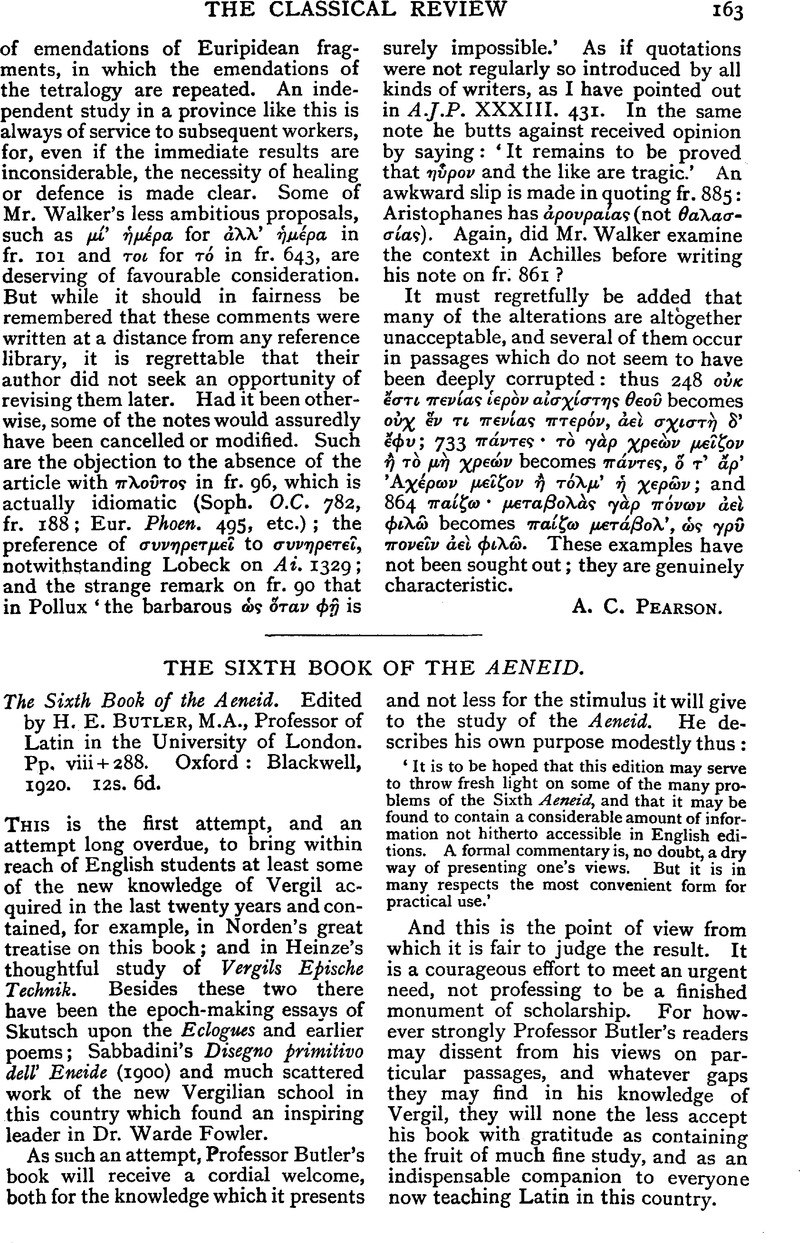No CrossRef data available.
Published online by Cambridge University Press: 27 October 2009

page 164 note 1 I have sought in vain for the source from which I reported it in a speech published in. J. Rom. Stud. III. p. 329).
page 164 note 2 Confirmation of Professor Butler's point of view on these episodes may be found in my lecture on the Growth of the Underworld (New Studies of a Great Inheritance, p. 112). Most of this paper was published in 1913 in Essays Presented to William Ridgeway, to which Professor Butler refers, unless I am mistaken, only on the question of the Ivory Gate, and then so briefly as in effect to mis-state my point.
I regard that passage (893–8) as a way of suggesting, but not of stating, to the reader that Vergil's account was even in his eyes surrounded by mystery. I cannot for a moment agree with Professor Butler's view that such a suggestion is ‘out of keeping with the whole spirit of the book.’ The solemn invocation of 11. 263–7, to which Professor Butler appeals, only prays sit mihi fas audit a loqui, not to expound a special and direct revelation. Every one of the four lines hints at mystery and ignorance (silentes, nocte tacentia, audita, caligine mersas). This view is only, after all, a modification of that of Servius; and Professor Butler admits that he can offer no other explanation of the Ivory Gate; for he rejects the view of Professor Everett, which I admit (I.c. p. 135) as an additional point not in the least inconsistent with my own.
page 165 note 1 See The Youth of Vergil (Great Inheritance, p. 86 f.; also p. 121).
page 165 note 1 See further on this New Studies of a Great Inheritance, pp. 36 ff., 122 ff., 164, 181. Also a paper on Vergil in Classical Association ; Proceedings, 1906 (Manchester).
page 165 note 3 Before this criticism was printed, could not its author have noted that the first mention of Theseus is in a speech of Aeneas, who is pleading every example he can find to justify his own petition; and who, even so, as Servius and Norden note, dares not do more than mention him in passing?
page 166 note 1 I note with pleasure that Norden practically adopts Skutsch's view (Aeneis Buck. VI. [ed. 2], p. 124).
page 166 note 2 Professor Butler follows more than one distinguished writer in speaking of the ‘Fourth Georgic’ It is not a matter of great importance; but would these scholars like us to describe, say, the Third Book of the Nicomackeans as ‘Aristotle's Third Ethic’? The question is not wholly pedantic; for to use the name ‘Georgic’ in the (quite imaginary) singular helps to rob it of what little meaning the schoolboy or student may have been half persuaded by his teacher to attach to it. Most schoolboys, I fancy, are left to connect the name subconsciously with the Hanoverian dynasty in this country.
page 167 note 1 Some of the following list of minor faults noted are errors rather than misprints, but it is hard to draw the line. On 1.757 the note cites a non-existent note on 1. 61; p. 19, ‘the visit of Aeneid to the Underworld’; p. 36, footnote (last word): what is ‘cuit’? P. 37, footnote, Reifferscheid's suggestion, as quoted, in no way meets the difficulty which Professor Butler states; p. 79, ‘the use of uolo in prohibitions’ is surely a phantom? P. 86, two hyphens instead of dashes make hay of the note on 1. 13; p. 90, 1. 20, what is Androgeonese? (The line meant in Catullus is probably 77, not 67.) P. 90, the n. on 1. 40 has lost (I imagine) an ‘as’ in the second line and, without it, is nonsense; p. 104 on 1. 92, what is ‘insubidius’? P. 155 on 1. 309 read ![]() . On p. 156, 1.312 (and else where) occurs the miserably ambiguous sign= if it is used for ‘meaning,’ the statement is, I think, incorrect; and so the strangely dogmatic ‘merely’ on p. 160, 1. 337; p. 161, 1. 345, ponto must go with incolumem, however the Ablative be regarded; p. 172, 1. 434, occupat Aeneas auditum (!); p. 198, 1. 555, Tisiphone palla succincti (!) cruenta; pp. 203 and 210, the well-known commentator Gossrau is twice called ‘Grossrau’; p. 203, the last line of the Greek quotation—which presumably contained its point—is gibberish as printed; p. 230, 1. 7: what passage in Plato is referred to by ‘II. cc.’? P. 206, 1. 6: do ‘them’ and ‘they’ refer to Ribbeck and Tantalus, who are the only persons yet mentioned on the page, save Pindar and Lucretius? Presumably some sentence referring to Varius and Tucca (not mentioned in the note as it stands) has vanished. But such conjectural restorations ought not to be necessary, and would not be, if the printer's reader knew his business.
. On p. 156, 1.312 (and else where) occurs the miserably ambiguous sign= if it is used for ‘meaning,’ the statement is, I think, incorrect; and so the strangely dogmatic ‘merely’ on p. 160, 1. 337; p. 161, 1. 345, ponto must go with incolumem, however the Ablative be regarded; p. 172, 1. 434, occupat Aeneas auditum (!); p. 198, 1. 555, Tisiphone palla succincti (!) cruenta; pp. 203 and 210, the well-known commentator Gossrau is twice called ‘Grossrau’; p. 203, the last line of the Greek quotation—which presumably contained its point—is gibberish as printed; p. 230, 1. 7: what passage in Plato is referred to by ‘II. cc.’? P. 206, 1. 6: do ‘them’ and ‘they’ refer to Ribbeck and Tantalus, who are the only persons yet mentioned on the page, save Pindar and Lucretius? Presumably some sentence referring to Varius and Tucca (not mentioned in the note as it stands) has vanished. But such conjectural restorations ought not to be necessary, and would not be, if the printer's reader knew his business.